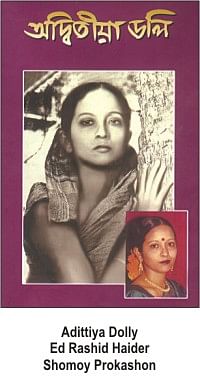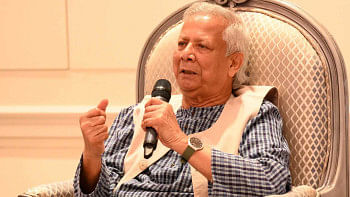She caused a flutter in young hearts

AS the train whizzed past Dolly, director Mashiuddin Shaker noticed the terrified look of the train driver, his forehead glistening with perspiration. Within a few moments, though, Dolly was persuaded by the cast to come down from the railway tracks and a terrible accident was averted. Shaker let out a sigh of relief as he had managed to overcome yet another hurdle in the shooting for the film Shurjo Dighol Bari. He already had to cope with changing two previous actresses for the unconventional role and he couldn't bear another mishap.
Dolly won a National Film Award for her role in the film Shurjo Dighol Bari. But the story could have ended that very day if the determined Dolly had decided to end her life on the railway tracks while the shooting was in its infancy.
Sadly, by then Dolly Ibrahim, the unmatched TV actress of the 1970s, had lost her will to live, a decision that ultimately led her to her demise at the age of 43. Though still young, she had accomplished a lifetime of achievements.
And after many a year, we are once more face to face with her astonishing life through the gripping memoir called Adittiya Dolly. The book, published by Shomoy Prokashoni to mark her birth anniversary on July 1, is a reminiscence of her story untold.
"Dolly was vivacious and always made us laugh. She was a student of literature, so she could easily grasp the language of the films. She had a natural subtle sensuality about her, although she could be very moody and unpredictable," writes Masihuddin Shaker.
Born to renowned educationist Dr. Nilima Ibrahim and physician Dr.Md. Ibrahim, Dolly, the second of five sisters, was deeply inclined towards the theatre and arts. The book weaves a vivid story of her childhood, as her obvious talents started to surface from quite early on.
The Dhaka University campus where she resided with her parents was the epicentre of politics and culture in the early 1970s. The mass upsurge of March 1971 that culminated as a result of 1969 left a mark on young Dolly's mind. A student of literature at Jagannath College, she witnessed student unrest against the Ayub regime, the Agartala conspiracy case and took active part in protest rallies against the regime. It was here that she met and grew fond of the student leader Raju. When they got married she was hardly 18.
Coming from a family deeply entrenched in cultural activities, she was eyed by movie directors from very early on as the potential lead actress for the ground breaking productions that were being developed at that time. She did not disappoint.
She was cast as the protagonist in the first play on BTV called Ektala Dotala, the first drama serial Roj Roj, that gained massive popularity, the first art film Surjo Dighol Bari, and played lead roles in Zahir Raihan's Borof Gola Nodi and Arek Phalgun on BTV. On stage she was no less an actress and gave a lively performance at the Teacher-Student Centre (TSC) in the play Chithi by Munier Chowdhury.
In post-liberation Bangladesh, Dolly's dedication to her art and her natural ability to get "into the skin" of her roles ensured her a meteoric rise to stardom. "Ajmeri Zaman, Ferdousi Majumdar and Dolly Ibrahim were the most sought after actresses of the golden era of BTV drama", says noted actor director Abdullah Al Mamun in the compilation.
Very few people knew at that time the deep-set issues that were affecting her personal life. While donning the role of Joigun in Shurjo Dighol Bari, her eyes seemed to have lost that ever-present sparkle as she started to struggle with her demons. A determined Dolly tried her best not to let that dampen her spirits. But as some people noted, she hardly called for the make-up man anymore when she needed to shed tears on the set playing the role of a distressed mother, an oppressed wife.
She continued to perform side by side with powerful actors of that time, such as Mustafa, Abdullah al Mamun and many more.
TV play director Begum Mumtaz Hossain narrates how reputed Indian film editor Dulal Dutta noted Satyajit Ray showering praise on the actress for her role in the TV play Bokul phool kotoduur.
Dolly's presence caused a flutter in young hearts, writes poet Nirmolendu Goon. It was his dream come true when he played the lead role opposite Dolly in a TV play telecast live during the 1970s. Nirmolendu smiles when he remembers the time when he held on to Dolly's hands even when the scene had ended. Dolly had to forcibly free her hand, an incident that still triggers laughter amongst those who witnessed the scene!
Dolly was a rebel at heart and far ahead of her time, reads her memoirs. Determined to be in control of her life, she finally cut ties with her husband while working on the unconventional role of Joigun in her debut film. After sometime, she thought she had found her soul mate in eminent photographer Anwar Hossain.
From then on Dolly distanced herself from her old life and sought a new identity. She immersed herself in new fields such as photography. She took on the responsibilities of director of an advertisement agency and became editor of a weekly, Sathdin. She had bid farewell to the stage that had so galvanised her, and with it, it seemed her energy to live on slowly ebbed away.
The memoirs provide an insight into how she felt misunderstood by society, her friends and family. She started to falter in her beliefs until one fateful night when Dolly's younger sister answered a call from the Dhaka Medical College. The gifted actress had performed one last act from where there was no return. She had truly waved the world goodbye. But through these recollections of her life she seems to have left behind her script. So her story does not remain untold.

 For all latest news, follow The Daily Star's Google News channel.
For all latest news, follow The Daily Star's Google News channel. 



Comments